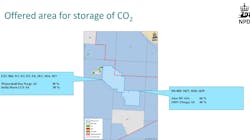Norway awards two more North Sea carbon store licenses
Offshore staff
OSLO, Norway — The Norwegian Ministry of Petroleum and Energy has awarded four companies exploration licenses for CO2 storage in two areas of the North Sea.
A total of six companies submitted applications under a process that started last November.
Aker BP and OMV jointly secured the Poseidon license in the Norwegian North Sea, with Aker BP named operator. The Phase 1 commitments comprise G&G studies, including 3D geo- and reservoir modeling as well as risk mitigation studies with a description of potential leakage paths for injected CO2.
Poseidon could potentially store more than 5 MMt per year of CO2 that would be captured from multiple identified industrial emitters in northwest Europe.
Aker BP and OMV have a collaboration agreement with Höegh LNG to provide the marine CO2 infrastructure required to collect, aggregate and transport the CO2 from the various emitters to the Norwegian Continental Shelf (NCS).
Höegh LNG has developed marine CCS solutions based on its experience operating LNG infrastructure, including three floating LNG import terminals completed last year offshore Germany.
Aker BP said it was assessing CO2 storage opportunities on the NCS as a potential new business and a potential decarbonization lever for the company in the longer term. It plans to apply its experience in reservoir management, drilling and wells, and logistics offshore Norway.
OMV Group aims to store 5 MMt per year of CO2 by 2030. OMV (Norge) brings subsurface competence from operated exploration activities and via partnerships in major producing fields on the NCS.
Wintershall Dea and its partner Altera gained the Havstjerne CO2 storage license of 135 km, with Wintershall Dea as operator. The estimated annual storage capacity is up to 7 MM metric tons.
Phase 1 obligations comprise seismic reprocessing/conditioning, G&G studies including 3D geo- and reservoir modelling, risk mitigation studies with a description of potential leakage paths for injected CO2, drilling of a wildcat well, and a formation test.
The partners intend to develop a system for transporting CO2 by ship to the Havstjerne license, which would offer storage to emitters around Europe. They have already investigated potential emitter clusters in the Baltic countries, the Netherlands, Portugal and Spain for sourcing CO2 for storage.
In addition to Havstjerne, Wintershall Dea operates the Luna license in the Norwegian North Sea for future storage of CO2 and is working with Equinor on the NOR-GE project’s 900-km-long CO2 pipeline.
Earlier this month, the company initiated first CO2 storage in the Danish North Sea as part of Project Greensand and claims to have proved the technology’s feasibility and safety.
03.31.2023
